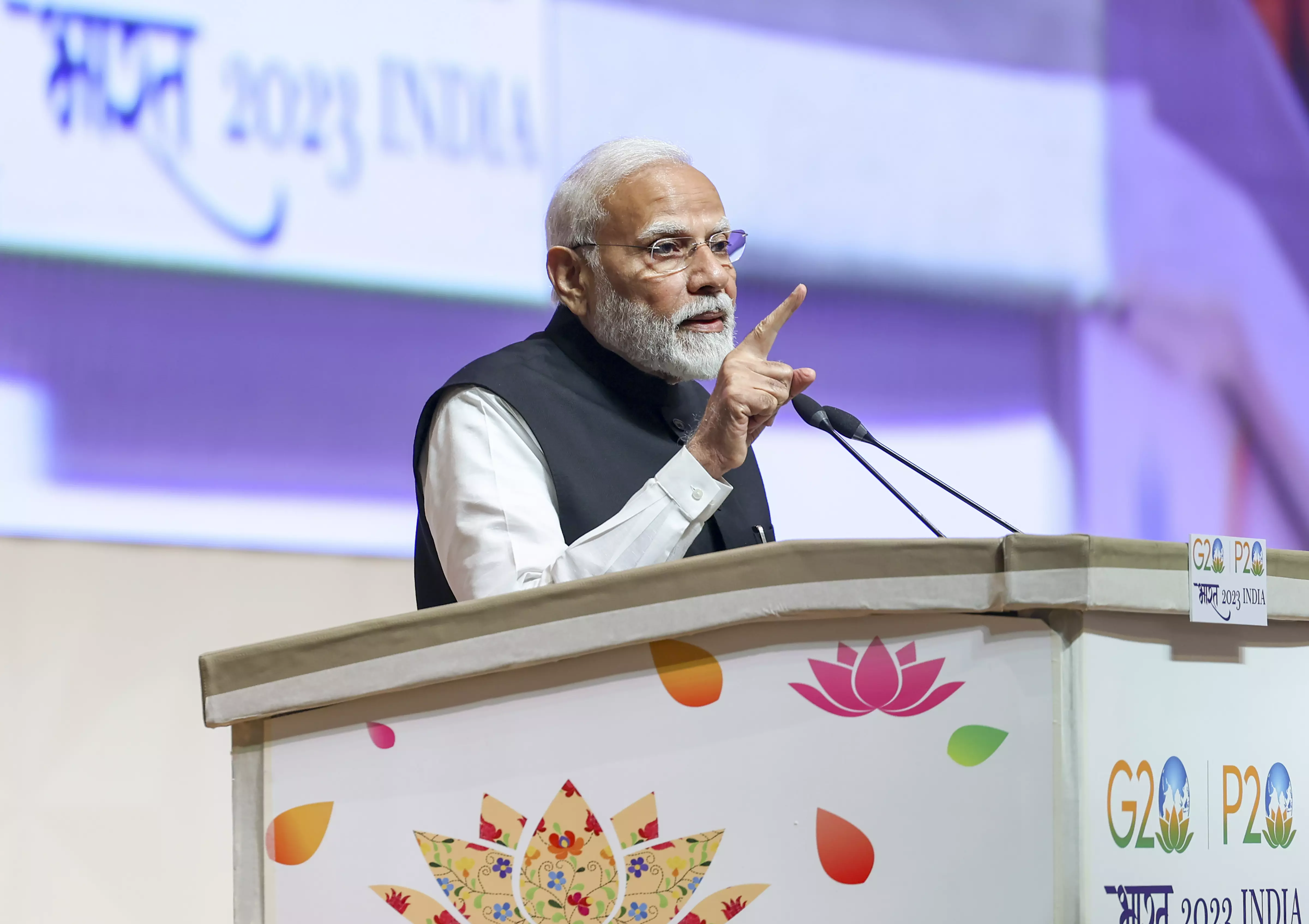
P20 Summit: Conflicts don't benefit anyone, time for peace: PM Modi
In a veiled reference to the ongoing Israel–Hamas conflict, the Prime Minister has called for moving forward with a human-centric approach to end such crises

Amid the ongoing Israel–Hamas war, Prime Minister Narendra Modi said on Friday (October 13) terrorism anywhere in the world and in any form is against humanity and conflicts do not benefit anyone, even as he asserted that “this is time for peace and brotherhood” as a divided world cannot provide solutions to big global challenges.
Addressing the inaugural session of the ninth G20 Parliamentary Speakers' Summit (P20) in Delhi, Modi called for ending the crisis in global trust and moving forward with a human-centric approach. “Everyone is aware of what is happening in various parts of the world. The world is grappling with conflicts and confrontations, such a world full of conflicts and confrontations is not in anyone's interest. A divided world cannot provide solutions to the big challenges before humanity,” the Prime Minister said.
“This is the time for peace, brotherhood, this is the time for moving forward together, this is the time for everyone's development and welfare. We have to end the crisis over global trust and move forward with a human-centric approach," he said.
While the Prime Minister did not mention any specific conflict or issue, his remarks come amid a raging war between Israel and Hamas, which has already seen a large number of casualties.
Attack on Indian Parliament
Modi also called for taking a tough approach in dealing with terrorism. “As you know, India has been facing the issue of cross-border terrorism for decades. Terrorists have killed thousands of innocents in India. Near the new Parliament building, you will find the old Parliament building. About 20 years ago, terrorists had targeted our Parliament. You will be startled to know that Parliament was in session at that time,” he said.
“Terrorists wanted to take hostage and kill MPs. India has dealt with numerous such terror incidents,” he noted. Now the world is also realising how big a challenge terrorism is for the world, Modi said. “Terrorism, wherever it may be, for whatever reason, in whatever form, is against humanity. In such a scenario, we will have to adopt a tough approach in dealing with terrorism,” he said.
No consensus on terrorism
Modi said it was saddening that consensus has not been achieved on the definition of terrorism. “Today also, in the UN, the international convention on combating terrorism is waiting for consensus,” he said and added that “enemies of humanity” are taking advantage of this approach of the world.
Prime Minister Modi's remarks come amid the escalating violence in the Middle East after multi-pronged attacks against Israel by Hamas militants from Gaza and the subsequent Israeli retaliation that has left around 2,600 people dead. Israel has launched a massive counter-offensive in Gaza to avenge the attacks by Hamas.
The sudden escalation in hostilities between Israel and Hamas has triggered global concerns. Leading powers like Germany, the US, France and the UK emphasised the importance of preventing the situation from further escalation.
Parliaments need to work together
In his address, Modi said Parliaments and representatives across the globe will have to think about how they can work together in this fight against terrorism.
The Prime Minister also underlined that there can be no better medium than public participation to deal with the world's challenges. “I have always believed that governments are formed by majority, but the country is run by consensus,” he said.
Modi called for looking at the world with the sentiment of one earth, one family, one future.
In making decisions for the world, the more the participation, the bigger the impact it would make, Modi said, and added that it was with this spirit, that India proposed making the African Union a G20 member. “I am happy that all member states accepted it,” he said.
The Prime Minister said the G20 presidency ensured festivities in India throughout the year and India landing on the moon added to the celebrations, a reference to the success of the Chandrayaan-3 mission.
He said 100 crore voters will cast their vote next year in general elections in India and invited all P20 delegates to visit again next year to witness the polls.
India has conducted 17 general elections and over 300 state assembly polls so far and the general elections in 2019, where his party became victorious for the second time in a row, was the world's biggest election, he noted.
When texts talked about systems like EVMs
Modi said the use of EVMs has boosted transparency and efficiency in the election process and results are now declared within hours of the start of counting of votes.
He also referred to the legacy of thousands of years of debates and deliberations in India and said some of our over 5,000-year-old texts also talked about such systems.
The event is being attended by Speakers of Parliaments of G20 members and invitee countries. The Pan-African Parliament will take part in the P20 Summit for the first time after the African Union became a member of G20 at the New Delhi G20 Leaders' Summit last month. The thematic sessions during this P20 Summit will focus on four subjects of transformation in people's lives through public digital platforms, women-led development, accelerating SDGs and sustainable energy transition.
(With agency inputs)

